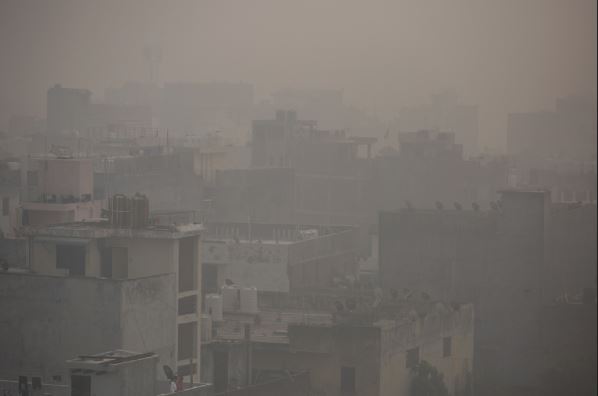India has shut down six of eleven coal-fired power plants within a 300-kilometer radius in Delhi, to counteract the poisonous haze that has descended on the city.
The power plant shutdown, which is expected to remain till the end of the month, comes just days after authorities in India’s capital imposed a “pollution lockdown” due to health concerns.
Schools will be closed for a week, construction has been halted, and those who can work from home are encouraged to do so.
Several times in recent weeks, Delhi’s pollution levels have exceeded the World Health Organization’s permissible standards, and doctors around the city have noticed an increase in patients with sudden onset respiratory ailments.
The Delhi administration is also said to be considering a full city-wide lockdown this weekend, with inhabitants possibly restricted to their houses, similar to last year’s harsh Covid-19 lockdown.
Environmentalists have argued that while these short-term measures will lead to a reduction in pollution levels, the government needs to make long-term changes.
The power station shutdown comes just days after India managed to dilute the Cop26 agreement to end the world’s reliance on fossil fuels.
Delhi, which has a population of 20 million people, is the world’s most polluted capital city, according to a University of Chicago study published in 2019. The study concluded that air pollution in Delhi reduces the typical resident’s life expectancy by ten years.
India has shut down six of eleven coal-fired power plants within a 300-kilometer radius in Delhi, to counteract the poisonous haze that has descended on the city.
The power plant shutdown, which is expected to remain till the end of the month, comes just days after authorities in India’s capital imposed a “pollution lockdown” due to health concerns.
Schools will be closed for a week, construction has been halted, and those who can work from home are encouraged to do so.
Several times in recent weeks, Delhi’s pollution levels have exceeded the World Health Organization’s permissible standards, and doctors around the city have noticed an increase in patients with sudden onset respiratory ailments.
The Delhi administration is also said to be considering a full city-wide lockdown this weekend, with inhabitants possibly restricted to their houses, similar to last year’s harsh Covid-19 lockdown.
Environmentalists have argued that while these short-term measures will lead to a reduction in pollution levels, the government needs to make long-term changes.
The power station shutdown comes just days after India managed to dilute the Cop26 agreement to end the world’s reliance on fossil fuels.
Delhi, which has a population of 20 million people, is the world’s most polluted capital city, according to a University of Chicago study published in 2019. The study concluded that air pollution in Delhi reduces the typical resident’s life expectancy by ten years.
India has shut down six of eleven coal-fired power plants within a 300-kilometer radius in Delhi, to counteract the poisonous haze that has descended on the city.
The power plant shutdown, which is expected to remain till the end of the month, comes just days after authorities in India’s capital imposed a “pollution lockdown” due to health concerns.
Schools will be closed for a week, construction has been halted, and those who can work from home are encouraged to do so.
Several times in recent weeks, Delhi’s pollution levels have exceeded the World Health Organization’s permissible standards, and doctors around the city have noticed an increase in patients with sudden onset respiratory ailments.
The Delhi administration is also said to be considering a full city-wide lockdown this weekend, with inhabitants possibly restricted to their houses, similar to last year’s harsh Covid-19 lockdown.
Environmentalists have argued that while these short-term measures will lead to a reduction in pollution levels, the government needs to make long-term changes.
The power station shutdown comes just days after India managed to dilute the Cop26 agreement to end the world’s reliance on fossil fuels.
Delhi, which has a population of 20 million people, is the world’s most polluted capital city, according to a University of Chicago study published in 2019. The study concluded that air pollution in Delhi reduces the typical resident’s life expectancy by ten years.
India has shut down six of eleven coal-fired power plants within a 300-kilometer radius in Delhi, to counteract the poisonous haze that has descended on the city.
The power plant shutdown, which is expected to remain till the end of the month, comes just days after authorities in India’s capital imposed a “pollution lockdown” due to health concerns.
Schools will be closed for a week, construction has been halted, and those who can work from home are encouraged to do so.
Several times in recent weeks, Delhi’s pollution levels have exceeded the World Health Organization’s permissible standards, and doctors around the city have noticed an increase in patients with sudden onset respiratory ailments.
The Delhi administration is also said to be considering a full city-wide lockdown this weekend, with inhabitants possibly restricted to their houses, similar to last year’s harsh Covid-19 lockdown.
Environmentalists have argued that while these short-term measures will lead to a reduction in pollution levels, the government needs to make long-term changes.
The power station shutdown comes just days after India managed to dilute the Cop26 agreement to end the world’s reliance on fossil fuels.
Delhi, which has a population of 20 million people, is the world’s most polluted capital city, according to a University of Chicago study published in 2019. The study concluded that air pollution in Delhi reduces the typical resident’s life expectancy by ten years.
India has shut down six of eleven coal-fired power plants within a 300-kilometer radius in Delhi, to counteract the poisonous haze that has descended on the city.
The power plant shutdown, which is expected to remain till the end of the month, comes just days after authorities in India’s capital imposed a “pollution lockdown” due to health concerns.
Schools will be closed for a week, construction has been halted, and those who can work from home are encouraged to do so.
Several times in recent weeks, Delhi’s pollution levels have exceeded the World Health Organization’s permissible standards, and doctors around the city have noticed an increase in patients with sudden onset respiratory ailments.
The Delhi administration is also said to be considering a full city-wide lockdown this weekend, with inhabitants possibly restricted to their houses, similar to last year’s harsh Covid-19 lockdown.
Environmentalists have argued that while these short-term measures will lead to a reduction in pollution levels, the government needs to make long-term changes.
The power station shutdown comes just days after India managed to dilute the Cop26 agreement to end the world’s reliance on fossil fuels.
Delhi, which has a population of 20 million people, is the world’s most polluted capital city, according to a University of Chicago study published in 2019. The study concluded that air pollution in Delhi reduces the typical resident’s life expectancy by ten years.
India has shut down six of eleven coal-fired power plants within a 300-kilometer radius in Delhi, to counteract the poisonous haze that has descended on the city.
The power plant shutdown, which is expected to remain till the end of the month, comes just days after authorities in India’s capital imposed a “pollution lockdown” due to health concerns.
Schools will be closed for a week, construction has been halted, and those who can work from home are encouraged to do so.
Several times in recent weeks, Delhi’s pollution levels have exceeded the World Health Organization’s permissible standards, and doctors around the city have noticed an increase in patients with sudden onset respiratory ailments.
The Delhi administration is also said to be considering a full city-wide lockdown this weekend, with inhabitants possibly restricted to their houses, similar to last year’s harsh Covid-19 lockdown.
Environmentalists have argued that while these short-term measures will lead to a reduction in pollution levels, the government needs to make long-term changes.
The power station shutdown comes just days after India managed to dilute the Cop26 agreement to end the world’s reliance on fossil fuels.
Delhi, which has a population of 20 million people, is the world’s most polluted capital city, according to a University of Chicago study published in 2019. The study concluded that air pollution in Delhi reduces the typical resident’s life expectancy by ten years.
India has shut down six of eleven coal-fired power plants within a 300-kilometer radius in Delhi, to counteract the poisonous haze that has descended on the city.
The power plant shutdown, which is expected to remain till the end of the month, comes just days after authorities in India’s capital imposed a “pollution lockdown” due to health concerns.
Schools will be closed for a week, construction has been halted, and those who can work from home are encouraged to do so.
Several times in recent weeks, Delhi’s pollution levels have exceeded the World Health Organization’s permissible standards, and doctors around the city have noticed an increase in patients with sudden onset respiratory ailments.
The Delhi administration is also said to be considering a full city-wide lockdown this weekend, with inhabitants possibly restricted to their houses, similar to last year’s harsh Covid-19 lockdown.
Environmentalists have argued that while these short-term measures will lead to a reduction in pollution levels, the government needs to make long-term changes.
The power station shutdown comes just days after India managed to dilute the Cop26 agreement to end the world’s reliance on fossil fuels.
Delhi, which has a population of 20 million people, is the world’s most polluted capital city, according to a University of Chicago study published in 2019. The study concluded that air pollution in Delhi reduces the typical resident’s life expectancy by ten years.
India has shut down six of eleven coal-fired power plants within a 300-kilometer radius in Delhi, to counteract the poisonous haze that has descended on the city.
The power plant shutdown, which is expected to remain till the end of the month, comes just days after authorities in India’s capital imposed a “pollution lockdown” due to health concerns.
Schools will be closed for a week, construction has been halted, and those who can work from home are encouraged to do so.
Several times in recent weeks, Delhi’s pollution levels have exceeded the World Health Organization’s permissible standards, and doctors around the city have noticed an increase in patients with sudden onset respiratory ailments.
The Delhi administration is also said to be considering a full city-wide lockdown this weekend, with inhabitants possibly restricted to their houses, similar to last year’s harsh Covid-19 lockdown.
Environmentalists have argued that while these short-term measures will lead to a reduction in pollution levels, the government needs to make long-term changes.
The power station shutdown comes just days after India managed to dilute the Cop26 agreement to end the world’s reliance on fossil fuels.
Delhi, which has a population of 20 million people, is the world’s most polluted capital city, according to a University of Chicago study published in 2019. The study concluded that air pollution in Delhi reduces the typical resident’s life expectancy by ten years.














